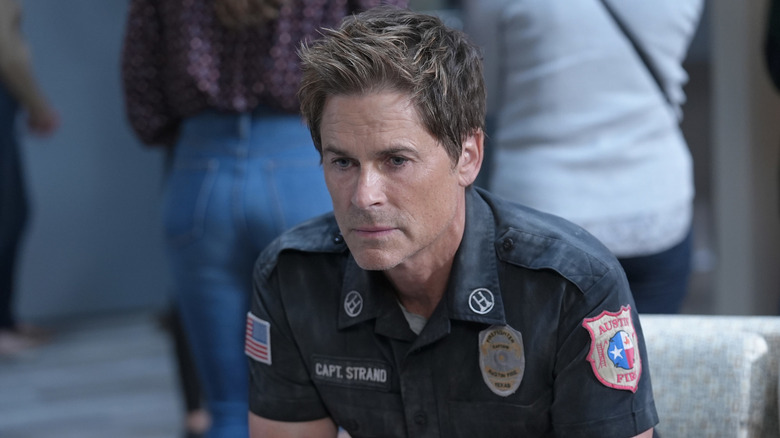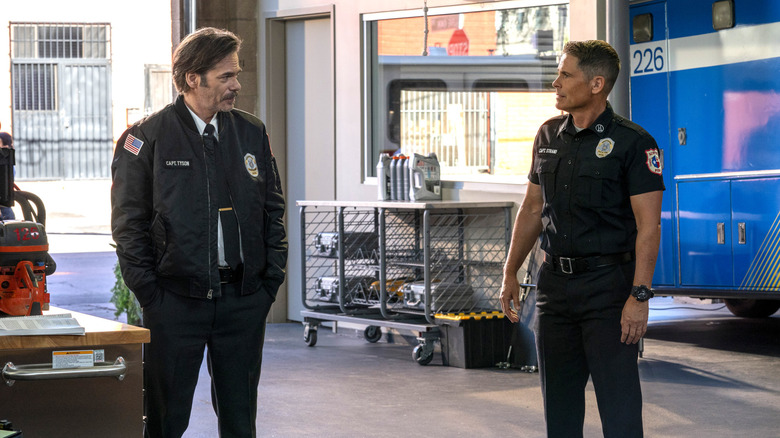Why Fox Canceled 9-1-1: Lone Star
We may receive a commission on purchases made from links.
There has never been a more perilous time to be on television. As the streaming era has evolved, things have evolved both radically and rapidly. As these big media companies have had to rationalize in the ever-shifting landscape, even shows that people seem to love fell by the wayside. Such was the case with "9-1-1: Lone Star," which hailed from TV mega-producer Ryan Murphy.
The series was a spin-off from the flagship "9-1-1" series, which premiered on Fox in 2018. It was a big enough hit that Murphy was able to build a whole universe out of it. Murphy, alongside co-creators Brad Falchuk and Tim Minear, managed to build on a similar core concept with a drama centered on first responders, while moving the action to a wildly different location. Namely, Austin, Texas.
"Lone Star" centers on Owen Strand (Rob Lowe), who was the lone survivor of his Manhattan firehouse on 9/11. In the wake of the attack, he was left with the brutal task of rebuilding the station. After a similar tragedy strikes a firehouse in Austin, Owen takes his progressive philosophies to Texas to help them start anew.
The show took off like a rocket initially, becoming a huge ratings hit for Fox. It didn't hurt that "Lone Star" season 1 boasted an impressive cast, including Liv Tyler. But a lot changed from the time the series premiered in January 2020 to when it was canceled by the network in May 2023, when the show was renewed for a fifth and final season. But why did Fox cancel it rather than go for season 6? As it often does, it came down to return on investment. The economics just didn't support it anymore.
9-1-1: Lone Star didn't make financial sense anymore
Following the $71.3 billion merger between Disney and Fox in 2019, the entire media landscape changed. The Fox network was not part of the sale, but the newly-named 20th Television was. So, a Disney-produced show was now airing on Fox, which meant that the pot was being split between multiple parties. That complicated the finances.
Further complicating matters was the fact that "Lone Star" had dipped badly in the ratings by season 5. The first season averaged 9 million viewers per episode. That number dropped to just over 3 million by the time of the season 5 premiere. Speaking to Variety in October 2024, Murphy explained in his own words why the show was going away. Here's what he had to say about it:
"Tim Minear and I are working on a new spinoff that we're actually writing, and that we hope to get on the air next fall. Sadly, we all love 'Lone Star,' but the financials just didn't work. It's a Disney company that was on a Fox network, and it just was never going to work. And we had a long run of it. So now we're going to launch a new show in a new city that I can't name, but it's fun. And '9-1-1' moved to ABC and suddenly became, I think, the biggest show on Thursday night. They obviously have an appetite for that, so we're going to give them another one that I really love."
To Murphy's point, "9-1-1" moved from Fox to ABC in 2023, a network owned by Disney. That made far more financial sense for all involved. Looking to emulate that move, a new spin-off titled "9-1-1: Nashville" was ordered to series at ABC in February 2025 (via Variety). For Murphy, Disney, and fans, that show can help fill the void left behind by "Lone Star" when it eventually premieres.
You can buy or rent "9-1-1: Lone Star" on Amazon Prime Video.

